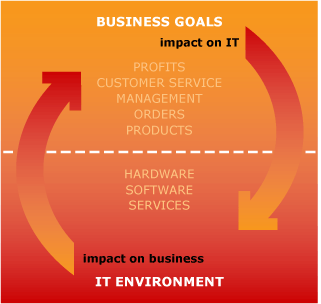Financial Management for IT
Financial management is no longer an afterthought in IT.
Most IT shops do not make full use of the financial tools and techniques available, leading to difficult conversations with CFOs. Unfortunately, most IT organizations manage their financial planning, management and control using an assortment of "silo-specific" solutions, usually a collection of spreadsheets tied to different tools. This approach cannot convincingly and consistently defend the connection between business value and IT spending. Without the tools to clearly link IT investment to creating organizational value, the IT group is viewed by senior management as a cost center that costs too much.

Information Technology is central to the ongoing success and financial health of every large organization. Competitive environments are changing faster than most companies' IT can respond. IT managers must even justify investments to "just keep the lights on", while driving down IT costs to the business—without endangering long-term IT capabilities. Although new technologies, such as SOA (Service Oriented Architecture), may improve agility, IT managers must trade off support now against cost reduction tomorrow and new business functionality the day after.
“I've never seen a better IT investment presentation. First, they asked for my standard financial evaluations templates and asked
some pertinent questions about how the company made financial decisions. At the next meeting, they presented the funding proposal
completely in business and financial terms using all my own templates. They had even created a sensitivity/risk analysis and project cash
flow that compared technical alternatives along with suggested financial measures of success…”
CFO of an Investment Management Firm
To run IT as a business, IT must put in place the necessary tools and processes.
- link the selection and purchase of all IT resources to business strategy and value created,
- optimally manage the selection, contracting and purchasing of IT resources,
- track and manage every IT (hardware, software and services) purchase and subsequent utilization,
- prove business benefits of IT purchases using financial analysis,
- enable continuous cost and value improvement,
- demonstrate consistent, controlled and appropriate financial management by rapidly evaluating and allocating resources across competing initiatives,
- demonstrate in business terms the value contributed by IT,
- justify the total, program, project and ongoing financial investment in IT.
Our consultants understand the tools of financial as well as IT management. We can help you demonstrate to your managers the connection between IT investment and business value.
We have specific experience in all areas of IT financial management, including:
- Linking business strategy to tech strategy
- Practical IT-specific financial planning and investment models (e.g., TCO, IRR, NPV, RAYROC, portfolio analysis) based on your CFO's models, to connect IT's contribution to enterprise-strategic plan financials
- Financial tools for PMO, project and application development including technology-specific Business Value Assessments
- Vendor selection based on tech strategy and financial requirements;
- Contract negotiation, SLA contract analysis benchmarking, software licensing control, services and selective outsourcing,
- IT asset management, especially software license management
- Financial analysis of virtualization initiatives to optimize ROI
- Costing techniques for large distributed infrastructure projects,
- Fact-driven expense reduction programs,
- Financial management overviews for key technical contributors,
- Capacity, performance and recovery,
- Integration of tools for managing IT as a business (including traditional costing and chargeback analyses).
IT must go beyond reacting to and managing technical demands - IT must show in financial terms how it can enable value.
The goal: to fasten IT Business Service Management to a sound financial foundation that can enable an understanding between IT, business line management, the CFO and executive management about how to create and sustain real business value by:
- delivering faster, more comprehensive, and consistent business services,
- increasing revenue opportunities,
- reducing the cost of ownership,
- minimizing the risk of unnecessary IT expenditures

